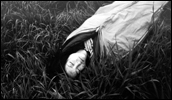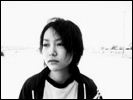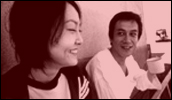Hole in the Sky
- Year
- 2001
- Original title
- Sora no Ana
- Japanese title
- 空の穴
- Director
- Cast
- Running time
- 127 minutes
- Published
- 3 July 2001



by Tom Mes
In 1997, Kazuyoshi Kumakiri created more than a ripple in the festival pond with his extraordinarily violent debut film Kichiku (Kichiku Dai Enkai), his graduation work at the Osaka University of the Arts that went on to garner a selection for the Berlin Film Festival. Despite the promise this film held, and an appeal which went far beyond the realm of the splatter genre it was mistakenly believed to be part of, it took the young director four years to come up with his sophomore effort, the altogether more restrained Hole in the Sky.
Set on the director's home turf of Hokkaido, Hole in the Sky deals with Tae (a pre-Oscar glory Rinko Kikuchi still credited under her real name Yuriko), out on a road trip with her boyfriend. They stop at an isolated roadside restaurant for a bathroom break, but when Tae re-emerges, she finds in a none too subtle manner that she has been dumped; her boyfriend has taken off, leaving only her luggage behind. Stranded in this desolate landscape with no money, she goes into the restaurant and runs off without paying for her meal. But with nowhere to go, she has no option but to spend the night in the restaurant's shed. The next night, trying to light a fire to keep herself warm, she sets the whole shed ablaze.
Ichio (the ubiquitous Terajima in a rare lead part), who runs the restaurant with his temporarily absent father, takes pity on her and allows her to stay in his house, on the condition that she will work in the restaurant to settle the bill for the meal she never paid. Having a woman around the house is new to Ichio, who has only ever lived with his father and late mother. With Tae in emotional shambles, something develops between them which slowly starts to resemble a relationship.
It would be a bit of a shoe-in to say that Hole in the Sky is worlds apart from Kichiku. However, the two films are not so different at all as both deal with the emotional behaviour of characters living in relative isolation. Violence lurks in these characters too, their confused attraction to each other leading to sometimes irrational behaviour, but it's only one of a gamut of emotions.
As a character study, Hole in the Sky is better developed than Kichiku, largely thanks to dealing with two distinct individuals rather than a group whose members were subject to the dynamics of the unit. The psychology of Ichio is slowly and believably unravelled to include a mother complex large enough to rival that of Norman Bates (in fact the spirit of Hitchcock is recalled on several occasions, notably in the scene where Ichio has Tae wear his mother's clothes, bringing to mind Kim Novak's metamorphosis at the hands of James Stewart in Vertigo), while Tae's emotional immaturity and dependability are credible motives for a behaviour which sometimes borders on self-negligence.
Hole in the Sky is proof of its young director's abilities to create and portray well-rounded, believable and fascinating human characters, whose actions ring true. Combined with an excellent performance by Terajima and an able screen debut from Kikuchi, this makes for often touching and engaging drama. However, at over two hours, its nearly minimalistic restraint does overstay its welcome. Despite all it has going for it, you'd be excused if you found Hole in the Sky to be a bit on the boring side.